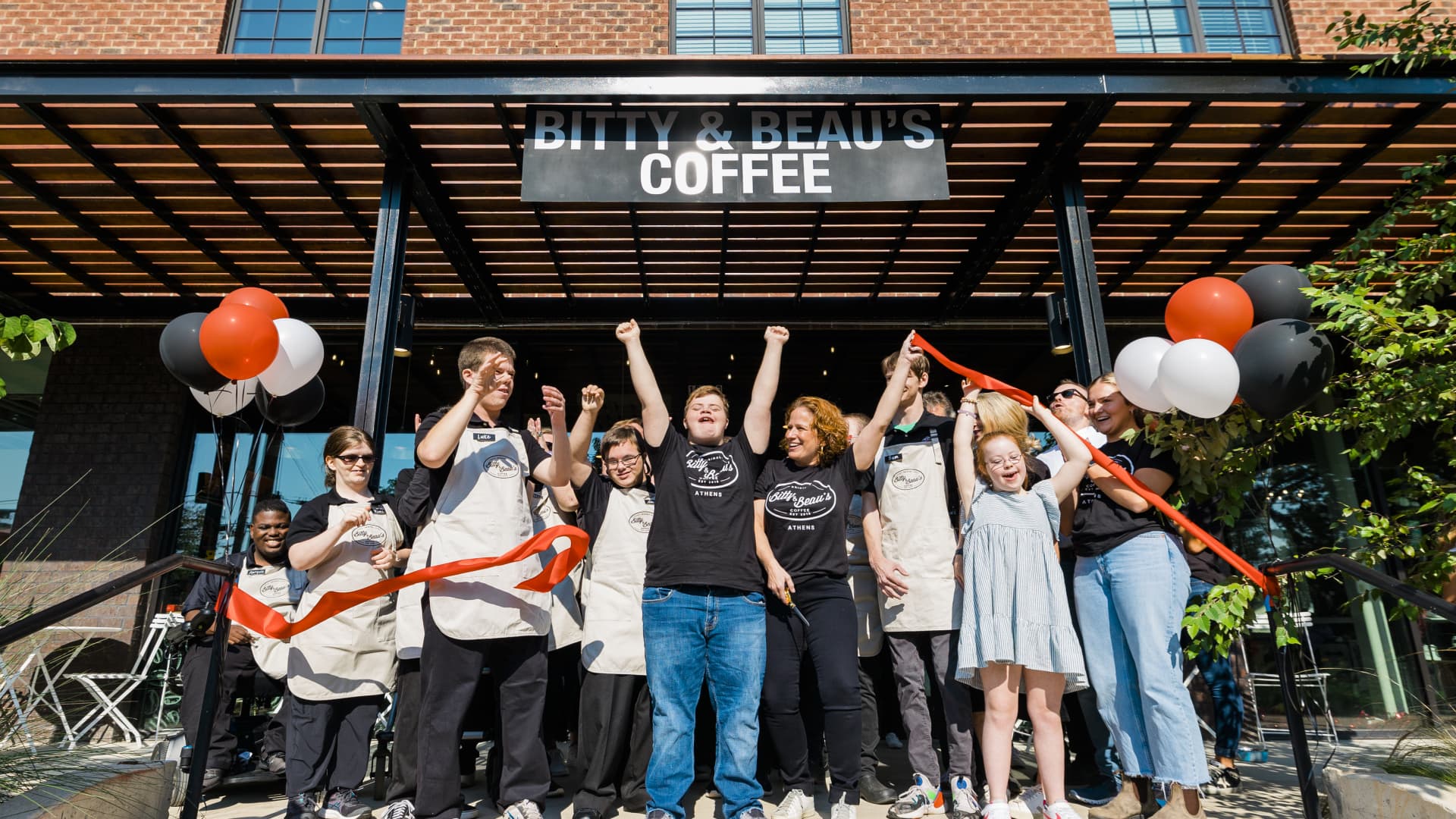With national labor market data showing that the economy only provides jobs for one out of every five Americans with intellectual and developmental disabilities, the opportunities for those with I/DD in the workforce are clearly lacking. Amy and Ben Wright, co-founders of Bitty and Beau’s Coffee, are entrepreneurs — and parents — making a dent in this disconnect between available labor and market demand, and at a time when employers have struggled to find enough workers to fill all of their open positions.
The Wrights have four children, the youngest two diagnosed with Down syndrome. They opened their coffee franchise, named for these children, to show that a business model can be a success based o hiring the disabled. Bitty & Beau’s has grown to 19 stores and over 400 employees, the majority with disabilities.
“Any business can take this model of employing at least one person with a disability in their organization,” Ben Wright said during an interview with CNBC’s Sharon Epperson at the Small Business Playbook virtual summit on Wednesday. “What I saw was that when people spent time with our kids, Bitty and Beau, who have Down syndrome, it changed them. They saw them as real people, not just oh, there’s a person with a disability.”
He stressed that society and the business sector need to reframe their view of people with disabilities, who are, “deserving of the innovation that the business world can bring to bear on them.”
The numbers have been improving. In 2022, the labor force participation rate (23.1%) and the employment–population ratio (21.3 percent) for disabled workers increased, according to the Bureau of Labor Statistics. Those were record levels for this data since the BLS began tracking it in 2008. Unemployment among disabled workers also fell by 2.5 percentage points to 7.6% in 2022. But that is still twice as high as unemployment among the non-disabled. Meanwhile, the employment–population ratio for people with no disability was 65.4% last year (the BLS notes that a disabled population that skews older relative to the non-disabled population is one contributing factor in this gap).
Although the Wrights find the recent improvements encouraging, they say there’s still a long way to go.
The first Bitty and Beau’s Coffee opened in 2016, in Amy’s hometown of Wilmington, North Carolina, after she quit her job at another one of her ventures — a theater program for kids. Ben left his job in 2020, after working at a financial advisory firm he founded in 2013, to work on the Bitty and Beau’s franchise full-time. Bitty and Beau’s is operational in 11 states with a majority of its 19 locations across the South, Southwest, Midwest and Northeast.
At the CNBC small business event, the Wrights provided some starting advice for employers on how to be more inclusive in hiring.
Start a conversation at your company.
Amy said it is as simple as an owner saying, “this matters to us.”
Spreading the message will have an impact on employees, she says, and sets an example for other businesses in your community by demonstrating that you prioritize it.
She noted that with one in five people having a disability in the U.S., employees are likely to have relatives and friends that would be interested in employment. That could be a “great starting point,” she said.
Identify the best positions for workers with disabilities.
Once business leaders recognize people with I/DD are deserving of employment, they should find the right positions for these employees within their organizations, Ben said.
“Figure out what they can do and what ways you can innovate around them so that you can be successful,” Ben said, adding that in the Wrights experience, it is not always the first job that a disabled worker starts with that ends up being the best job for them.
Amy noted that even though the majority of its workers are disabled, the company employs non-disabled workers who are a key support network for the entire workforce.
Companies that get this right will prove that hiring workers with I/DD can become “a winning competitive advantage for your company,” he said.
Choose the right language for job postings.
While it is illegal in the U.S. to discriminate against disabled job candidates, Epperson noted during the interview that the top of a Bitty and Beau’s job description for a food service worker position at their D.C. location stated: “Reasonable accommodations may be made to enable individuals with disabilities to perform essential functions.”
That was notable because the language came before listing the job responsibilities.
Amy stressed the importance of such language for other businesses to highlight prominently. If someone would like to start working and “learn something new, we give you a chance and we figure out how we can make accommodations to set you up for success,” she said. “That’s truly how every business should look at it.”
